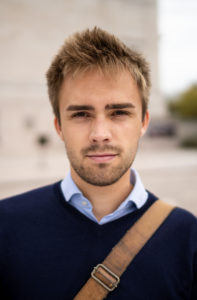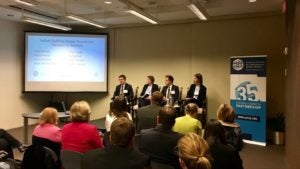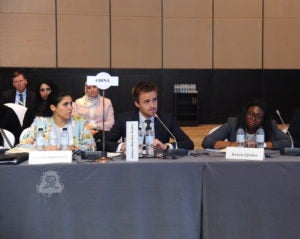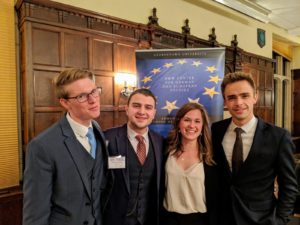Title: Julian Mueller-Kaler (MAGES’19): A Fulbright-Schuman Scholar Plays an Active Role in the Transatlantic Relationship

At a Glance
Hometown: Sommerach, Germany
Certificate: Diplomatic Studies
Languages: German, French
Favorite Classes: The U.S. and Iran, with Ambassador Stephen Mull; Multilateralism and U.S. Leadership, with Ambassador Jeffrey DeLaurentis
On-Campus Activities: International Forum on Diplomatic Training (Student Organizer)
2019 Transatlantic Policy Symposium (Co-Chair)
Non-GU Activities: American Institute for Contemporary German Studies (AICGS)
Office of the German Executive Director at the World Bank Group
Julian Mueller-Kaler, a graduate student in the Master of Arts in German and European Studies (MAGES) at the BMW Center, cites former U.S. President Barack Obama as the cause of his interest in politics. For a student from the tiny village of Sommerach in Bavaria, Germany, this might seem like a somewhat surprising choice. However, Mueller-Kaler’s specific interest within politics, the transatlantic relationship between the United States and Europe, has come to define his entire course of study and professional development. Following completion of his undergraduate degree at the Zeppelin University, on the shores of Lake Constance near the Swiss-German-Austrian border, Mueller-Kaler decided he needed to study in the United States to get a fuller perspective on the issues pertaining to his academic interests. He remembered a trip to Washington in 2011, when he had visited Georgetown and imagined himself as a student here. A stint studying abroad on the Hilltop during the 2016 election only enhanced his desire to become a Hoya.
In order to achieve this goal, Mueller-Kaler applied to and was awarded the highly prestigious Fulbright-Schuman scholarship, which is a specialized offshoot of the already well established Fulbright program designed to “promote mutual understanding between the peoples of the European Community and the United States including broader knowledge of their languages, cultures and institutions” and to “improve the quality of human resource development in both the European Community and the United States, including the acquisition of skills required to meet the challenges of the global knowledge-based economy.” With this grant in hand, Mueller-Kaler chose to attend the SFS’ MAGES program. He explains that he knew it would be “the perfect fit,” as he would be able to study international relations, while simultaneously guarding his European focus. Since being at Georgetown, Mueller-Kaler has delved further into the focus of his undergraduate research, which looked into the rise of populist actors in Europe and the United States, specifically examining the correlation between the rise of right wing populism and the simultaneous decline of left leaning and social democratic parties. Mueller-Kaler has also made use of MAGES’ flexibility; he has taken classes from within other programs and even added on a certificate with the Institute for the Study of Diplomacy (ISD).

Mueller-Kaler was hesitant to name specific classes at Georgetown as his favorites, emphasizing that he enjoyed the challenge of each one so much that he chose to become the first student in the Institute for the Study of Diplomacy to elect to take two capstone courses. However he singled out a seminar taught by Ambassador Stephen Mull (SFS’80) on U.S.-Iran relations as particularly seminal to his interest in diplomacy. Mull formerly served as the the chief implementer of the Iran Nuclear Deal. When Mueller-Kaler took the class, the Trump Administration was in the process of extricating the United States from the Deal, making the course all the more relevant and impactful.
During his studies, Mueller-Kaler developed strong relationships with various faculty within the Institute for the Study of Diplomacy and the MAGES program. In this way, he was able to develop both personal and professional mentors. One of these figures is Steve LeVine, Future Editor for Axios, who teaches a class on energy and security. “We are in regular contact, exchange ideas, and I enjoy talking to and learning from him tremendously.“
Since being at Georgetown Mueller-Kaler has enjoyed the benefits of the thriving Fulbright community in DC, which he notes is imbued with the values of “mutual understanding and international cooperation.” In a recent interview, he sung the praises of the program, which he emphatically states is the reason he took the plunge and moved to the United States: “a Fulbright scholarship is much more than monthly financial stipends. Joining an exclusive community that consists of incredible scholars from all around the world is not only a great joy, but also a tremendous learning opportunity.” Mueller-Kaler has also enjoyed the offerings of Washington more broadly, calling it “such a great city to live in. I was really able to make the most of its rich cultural offers. Whether it’s museums, the National Mall, or various concerts – it’s worth leaving Georgetown from time to time and enjoy the capital.”

When not in class or exploring the city, Mueller-Kaler had time to build his resume by attending conferences and engaging in professional development activities. In November 2018, he travelled to Abu Dhabi in the United Arab Emirates to participate in the Future Diplomats PeaceGame, an event organized by the Foreign Policy Group, the Emirates Diplomatic Academy, and Harvard University’s Belfer Center for Science. The PeaceGame gathers together the next generation of foreign policy leaders and asks participants to “game out” peaceful resolutions to serious conflicts.
“The PeaceGame was a tremendous learning opportunity and a wonderful personal experience for me. Representing the Institute for the Study of Diplomacy among a selective group of junior diplomats from around the world has certainly been one of my highlights during my time at Georgetown.”

In addition to the PeaceGame, Mueller-Kaler helped organize the annual International Forum on Diplomatic Training (IFDT) in September 2018. The event, which is a joint School of Foreign Service and ISD project, brings together deans and directors of schools and institutes dedicated to the education and training of diplomats. Mueller-Kaler recalls sitting next to the current Deputy Secretary of State, John J. Sullivan, at IFDT’s Gala Dinner at the State Department as yet another highlight of his SFS experience. He remarked that “the Institute for the Study of Diplomacy and its Director, Ambassador Barbara Bodine, in particular have provided me with many unique opportunities that greatly enhanced my time at Georgetown.” Furthermore, Mueller-Kaler also acted as co-chair of the Transatlantic Policy Symposium (TAPS) on the topic of “Liberalism in Peril?” which directly relates to his course of study. TAPS is an annual conference fully organized and run by graduate students of the BMW Center for German and European Studies that gathers academics, students, and professionals from around the world to discuss pressing issues at the heart of the transatlantic
Following graduation, Mueller-Kaler will begin 18 months of academic training provided by the Fulbright-Schuman program, which can be used for any work related to the subject of his studies. He looks forward to using this opportunity to continue his interest in American politics and international relations. While studying at Georgetown, Mueller-Kaler has been a Non-Resident Fellow at the American Institute for Contemporary German Studies (AICGS) and a consultant in the Office of the German Executive Director at the World Bank Group. Long-term, he is considering continuing his work at the World Bank, joining the German Foreign Service, pursuing a doctorate degree, or even advancing into the world of politics himself.